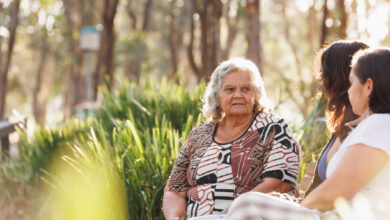Ageism may be the result, but is it the cause? – opinion

This is a difficult time for aged care in Australia in so many ways. We know this from personal experience working in aged care or from using it or visiting loved ones dependent on it. We know it also from the media.
Many of the problems in Australia appear to be self-inflicted through poorly designed and implemented policy. But most are also encountered in one form or another in other countries across the globe.
It turns out that when we consider the impact of Covid on aged care, we are not alone.
Across the globe, aged care has fared badly during the pandemic, as was recently documented in the double edition of the International Journal of Care and Caring devoted to the impact of the pandemic on care, which I edited along with Joan Tronto.
Plenty of other evidence is available, most importantly the specialist aged care collection produced by the International Long Term Care Policy Network, which is coordinated through the LSE in London.
Referring to recent data from the Australian Department of Health, Mike Rungie pointed out recently in Insite that more residents in aged care facilities in this country had died with Covid in the previous 10 weeks than in the first two years of the pandemic (2020 and 2021) combined.
Others point out that staff shortages have continued to limit support available to residents in homes while lockdowns and closures have affected large numbers of homes, isolating residents from their families for lengthy periods, in some cases for months.
Internationally, as well as here, there is a sort of collective pretence that everything seems to be getting better as Covid is put behind us. This stance has been quite deliberately promoted by governments almost everywhere, with the exception of China.
The official picture nevertheless confirms both the ongoing danger of the disease and the decline in mortality: according to World Meter, a total of 8,702 deaths worldwide were reported as due to Covid 19 in the week ending 7 October.
This relatively low figure was down 9 percent from the previous week. But, like the Australian media, the international figures, do not report on any concentration of deaths in aged care homes.
It is right to be angry about this. ‘Why is there no outcry’, asks Rugie? It seems we’ve been taught to think it’s OK to die of Covid in residential care if you’re old and frail, he argues.
These people were about to die anyway, that’s why they end in care. Is he, and many others who agree with him, right when he sees the answer to the problems as confronting the ageism that led to them being placed in specialised care facilities?
I too see ageism in action in this reporting and casual acceptance of this tragedy. Ageism is a good description of the outcomes when old people die while the authorities and the general public turn a blind eye.
But is it the actual cause of the deaths? Might it actually be distracting us from dealing with the more immediate problems that need to be tackled?
The term ageism is seldom clearly defined. Robert Butler, the American psychiatrist and gerontologist, who coined the term back in 1969, described it as ‘another form of bigotry’.
Like racism and sexism ‘ageism can be seen as a process of systematic stereotyping of and discrimination against people because they are old’ he wrote.
This definition clearly applies to the relative silence in the media about the deaths of older people with Covid. It also applies to the way in which many employers seek to discriminate against potential employees on the basis of age. But this was not the cause the Covid deaths.
The evidence is that the death rate of old people differed markedly between settings. Those who received care at home did not die at anything like the rate of those in residential care.
The published data for the deaths during 2022 is poor. The figures covering January 2020-to November 2021 are however very clear. Although there are over four times more older people supported at home than are resident in aged care homes, 685 residents died with Covid in aged care facilities, whilst just 10 died who were in receipt of home care services.
The data suggests that we need think more clearly about the actual conditions to understand the protective features associated with isolating home care recipients in their own home, and compare that with the problems of concentrating vulnerable populations together in circumstances where cross infection is extremely likely.
As Rungie argues, cross infection is near inevitable when large numbers of people live communally in shared spaces. This points to some very concrete actions we need to take. First, we need to work hard to
provide a much better, 24 x 7 system of home care services that will keep more people at home, providing a genuine alternative to residential care.
Second, we also urgently need to develop approaches to the management of residential care services that will minimise cross- infection.
These approaches include better ventilation, better infection isolation, better staff and visitor screening and management.
In each case we need to recognise that while social isolation can provide necessary protection against cross-infection, it is also harmful and should not be promoted as a longer-term preventative measure.
Both at home and in homes, supporting, maintaining and where necessary developing social contact must be seen as central task for aged care services.
Ageism is difficult to eradicate. The evidence suggests that ageism is the result, not the cause of the problems. Worse still, real problems remain hidden if we allow the debate to be solely about ageism.
Let’s fight ageism. But it won’t disappear if we fail take concrete actions to build a truly
effective and just system of aged care services to serve us all.
Michael Fine is an Honorary Professor in the School of Social Sciences at Macquarie University.
Email: [email protected]





